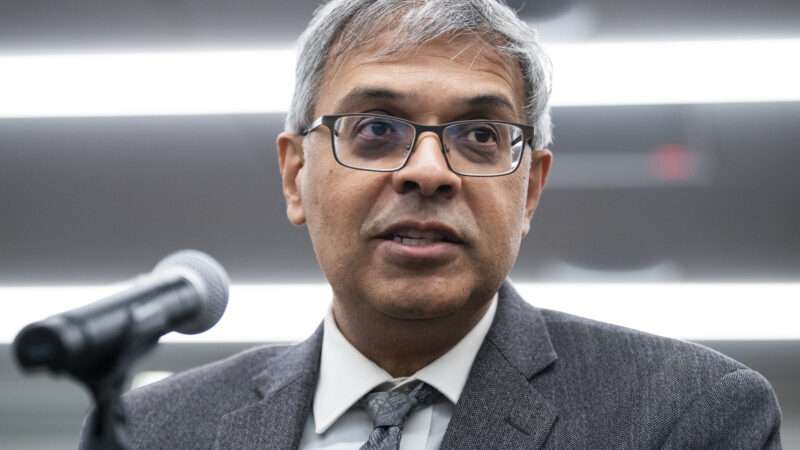
What a wild ride it's been. On Tuesday evening, President-elect Donald Trump announced that he'd nominate Stanford University professor Jay Bhattacharya to lead the National Institutes of Health (NIH).
Bhattacharya, a medical doctor and highly credentialed health and economics researcher, is a conventional, qualified pick to head up the federal government agency responsible for distributing some $47 billion in health research grants.
His nomination is nevertheless remarkable.
Bhattacharya made a name for himself during the COVID-19 pandemic as an arch-critic of lockdowns, mandatory masking, coercive vaccine policies, and other restrictive measures to combat the spread of the virus.
He was a co-author of the Great Barrington Declaration, which advocated for focused protection of vulnerable populations, and against society-wide restrictions of the general public, as a strategy for ending the pandemic.
The Great Barrington Declaration provoked immense controversy when it was first published in October 2020. After its release, then-NIH Director Francis Collins sent National Institutes of Allergy and Infectious Diseases (NIAID) Director Anthony Fauci an email dismissing Bhattacharya and his co-authors as "fringe epidemiologists" and demanding a "swift and devastating published take down" of the declaration's premises.
Collins' email was representative of the imperious attitude of public health officials at the time: Criticism of the government's restrictive approach to the pandemic was to be crushed, not debated.
Federal public health officials would successfully urge social media companies to suppress the spread of Bhattacharya's online commentary. Bhattacharya would later be a lead plaintiff in a lawsuit challenging the Biden administration's "jawboning" efforts.
That Bhattacharya is now being nominated to head an agency that sought to discredit him and suppress his speech is nothing short of revolutionary. It's a late-in-the-game triumph for critics of the heavy-handed public health establishment's approach to the pandemic.
Risky research and lab leaks. Bhattacharya's nomination to head NIH will also have major implications for the funding of so-called "gain-of-function" research and investigations into COVID-19's possible origins in an NIH-funded Chinese lab.
In their past roles as NIH and NIAID directors, Collins and Fauci were longtime proponents of a particular type of "gain-of-function" research that seeks to enhance the properties of a virus as a means of predicting what the next pandemic-causing pathogen will be and developing countermeasures to stop its spread.
Their agencies doled out generous grants to researchers conducting this type of work in Wuhan, China. Many of these grants arguably violated White House-level policies restricting funding to, or requiring more risk-benefit scrutiny of, gain-of-function research.
When a pandemic did emerge in Wuhan, China, Fauci derided credible speculation that NIH-funded research was responsible for COVID-19's creation as a fringe conspiracy theory.
In the pages of Reason, Bhattacharya criticized Fauci for "self-serving" and "lawyerly" denials about the type of research NIH was supporting in Wuhan.
He's also critical of this research generally. He's on the board of directors of the group Biosafety Now, which advocates for much tougher restrictions on this work.
An NIH helmed by Bhattacharya will likely be much more circumspect about funding gain-of-function research on potential pandemic pathogens.
We only know as much as we do about a potential lab leak origin of COVID because of the dogged work of Congressional investigators and investigative journalists, who've often had to sue government agencies to make public records on NIH-funded research available.
Under Bhattacharya's leadership, the agency will likely be much more transparent and forthcoming with documents about the work it was funding in Wuhan.
Ceasefire: Last night, news broke that both Israel and the militant group Hezbollah had agreed to a U.S.- and French-brokered deal to cease their war in southern Lebanon. The ceasefire was scheduled to go into effect early this morning local time. Reuters reports that the deal seems to be holding for now.
According to White House officials, the plan is for Israeli troops currently in southern Lebanon to withdraw back to Israel over the course of the next 60 days. Over the same time period, the Lebanese army will reoccupy the areas vacated by Israeli troops.
The ceasefire agreement does not affect the ongoing conflict in Gaza between Israel and Hamas.
Scenes from D.C.: In case you missed it, President Joe Biden continued the annual tradition of pardoning a turkey for Thanksgiving at a White House ceremony on Monday.
Join me as I pardon the National Thanksgiving Turkey in a ceremony on the South Lawn. https://t.co/Ca54auHIgX
— President Biden (@POTUS) November 25, 2024
It's a cute ritual (that apparently got its start as a classic Ronnie Reagan evasion of questions about the Iran-Contra scandal). As Reason's Billy Binion argued back in 2022, it'd be even cuter if the president pardoned some people who don't deserve to be in federal prison as well.
QUICK HITS
- The U.K.'s Labor government waters down its green energy targets, reports Politico.
- The city of San Francisco is demanding that local café owner Hilda Mendez remove several tables and chairs, plus a few cacti, she has in front of her business until she applies for the proper permits. Getting those permits could take up to six months reports the San Francisco Chronicle. Failure to remove the tables could result in daily $100 fines. Mendez worries that her business will fail without additional outdoor seating.
- Do they have no heart? Organ transplant charity uses its organ transplant jet for personal trips.
- The American Prospect does some conspiratorial dot-connecting between the "abundance agenda" and evil corporate money.
The post Dr. Jay in the House appeared first on Reason.com.







